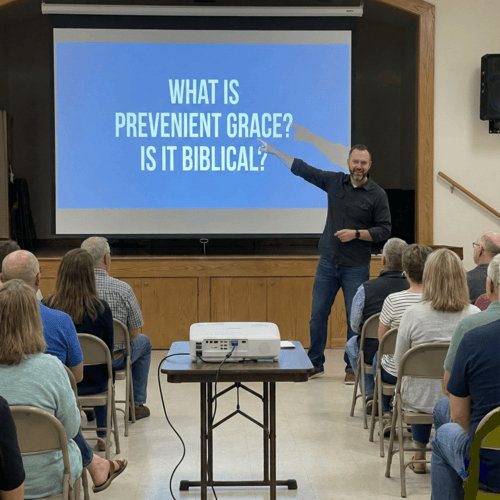Inerrancy Vs Infallibility: Which Does Scripture Demand We Affirm?
When discussing the nature of Scripture, two terms often arise: inerrancy and infallibility. While they may both sound similar—even equally good—they represent significantly different views of God’s Word. Inerrancy holds Scripture contains no errors in anything it affirms—whether doctrine, history, science, or any other topic. Infallibility, on the other hand, maintains Scripture will not fail in accomplishing its purpose of revealing God and bringing people to salvation, but may contain minor errors in non-theological matters.
For Reformed believers who hold to sola scriptura (Scripture alone), the distinction is far from academic. The question cuts to the heart of how we view divine revelation and ultimately God Himself. This post makes the case that Scripture itself demands we affirm its complete inerrancy, not merely its infallibility.
THEOLOGICAL FOUNDATIONS FOR INERRANCY
The doctrine of inerrancy flows naturally from who God is. Scripture identifies God as perfect (Matthew 5:48), truthful (Numbers 23:19), and unable to lie (Titus 1:2). If God cannot speak falsehood and Scripture is “God-breathed” (2 Timothy 3:16), the conclusion is inescapable: God’s Word must be entirely true in all it affirms.
As the Westminster Confession of Faith states, the Bible possesses “infallible truth and divine authority” (WCF 1.5). The Reformers didn’t distinguish between religious and non-religious truth in Scripture—they affirmed its complete trustworthiness precisely because it comes from God Himself.
RC Sproul put it clearly: “When the Bible speaks, God speaks.” If we believe God cannot err, then neither can His Word. To suggest otherwise would imply either God can make mistakes or that He chooses to communicate through an imperfect vehicle. Both positions undermine His perfect nature.
BIBLICAL SELF-ATTESTATION
Scripture itself makes claims about its nature that align with inerrancy, not merely infallibility:
- Jesus declared, “the Scripture cannot be broken” (John 10:35) and often based His arguments on the precise wording of Old Testament texts.
- He affirmed even the smallest details of Scripture: “Until heaven and earth pass away, not an iota, not a dot, will pass from the Law until all is accomplished” (Matthew 5:18).
- The Psalmist proclaims, “The words of the LORD are pure words, like silver refined in a furnace on the ground, purified seven times” (Psalm 12:6).
- Proverbs 30:5 states, “Every word of God proves true.”
Nowhere does Scripture qualify these statements to suggest God’s Word might contain errors in “non-essential” matters. Such a distinction is foreign to the Bible’s own testimony about itself.
WHY INFALLIBILITY ALONE IS INSUFFICIENT
Proponents of infallibility without inerrancy suggest that Scripture accomplishes its saving purpose despite potentially containing historical or scientific inaccuracies. This position faces several insurmountable problems:
- It creates an arbitrary division in Scripture. Who determines which parts are “theological” (and thus error-free) and which parts are “non-theological” (and potentially erroneous)? Such distinctions inevitably become subjective.
- It undermines the historical basis of faith. Christianity is a historical religion grounded in actual events. As JI Packer noted, “If the biblical history is unreliable, the biblical gospel is uncertain.”
- It contradicts Scripture’s self-testimony. The Bible makes numerous factual and historical claims that it presents as true, not merely illustrative.
- It introduces a dangerous hermeneutical principle. Once we decide some portions of Scripture may contain errors, what prevents us from dismissing challenging doctrines as human mistakes?
Herman Bavinck observes: “Scripture’s authority extends to all that it intends to teach us, not merely to some isolated religious truths segregated from historical facts.”
ADDRESSING COMMON OBJECTIONS
- “The human element in Scripture makes errors inevitable.” While God used human authors with their unique styles and perspectives, the doctrine of inspiration means He superintended the process to ensure the result was exactly what He intended. As 2 Peter 1:21 states, “men spoke from God as they were carried along by the Holy Spirit.” God’s use of human instruments doesn’t diminish the perfection of His Word.
- “There are apparent contradictions in the Bible.” Careful examination of alleged contradictions reveals that they are typically reconcilable through proper understanding of context, literary conventions, or historical background. The presence of apparent difficulties doesn’t disprove inerrancy; rather, it invites deeper study with the confidence that truth is consistent.
- “Scientific knowledge contradicts biblical claims.” Scripture wasn’t written to be a scientific textbook, but when it touches on matters related to the natural world, it speaks truthfully according to the observational language of its day. The Bible often uses phenomenological language—describing things as they appear—just as we still speak of “sunrise” despite knowing the earth revolves around the sun.
- “Textual variations and translation issues undermine inerrancy.” Inerrancy applies to the original autographs of Scripture. The remarkable textual preservation of the Bible means we can be confident our current texts faithfully represent the originals. Translation is an interpretive process, but this doesn’t diminish the inerrancy of the original texts.
PRACTICAL IMPLICATIONS OF INERRANCY
Affirming inerrancy isn’t merely about defending a theological position—it fundamentally shapes how we approach Scripture and the Christian life:
- It grounds our confidence in God’s Word. We can trust everything Scripture teaches, not just selected “spiritual” portions.
- It provides a firm foundation for preaching and teaching. As Calvin emphasised, ministers can proclaim “Thus says the Lord” with conviction.
- It guards against cultural compromise. When Scripture’s teaching conflicts with cultural values, inerrancy reminds us to submit to God’s infallible Word rather than fallible human opinions.
- It fosters humility before the text. Rather than standing in judgment over Scripture, determining which parts are true and which aren’t, we submit to its comprehensive authority.
CONCLUSION: INERRANCY VS INFALLIBILITY
The Reformed tradition has consistently affirmed the complete inerrancy of Scripture because that’s what Scripture itself demands. Settling for mere infallibility introduces an arbitrary element of human judgement that undermines biblical authority.
As BB Warfield wrote, “We accept the Bible’s testimony to itself as true, and bow before its declaration of its own origin and character as the very Word of God, precisely because the indicia by which its true character is established are not only numerous but compelling.”
When we stand before Scripture, we stand before God’s perfect, inerrant Word. Nothing less honours what God has said about His own revelation. Nothing less provides the sure foundation needed for our faith. And nothing less is worthy of the God who cannot lie.
“All Scripture is breathed out by God and profitable for teaching, for reproof, for correction, and for training in righteousness, that the man of God may be complete, equipped for every good work.” (2 Timothy 3:16-17)
INERRANCY VS INFALLIBILITY: RELATED FAQs
What was the Chicago Statement on Biblical Inerrancy and why does it matter? The Chicago Statement (1978) was a landmark document created by nearly 300 evangelical leaders to articulate a clear definition of biblical inerrancy. It affirms Scripture is “without error or fault in all its teaching” while addressing nuances of interpretation, historical context, and literary forms. The statement remains the most thorough and widely accepted articulation of inerrancy in evangelical circles.
- How did the “Battle for the Bible” in the 1970s-80s shape today’s understanding of inerrancy? The “Battle for the Bible” was a pivotal theological controversy where scholars such as Harold Lindsell exposed growing denial of inerrancy in evangelical institutions. This controversy led to institutional divisions but ultimately strengthened evangelical commitment to inerrancy, creating clearer theological boundaries and spurring the formation of organisations dedicated to defending biblical authority.
- How do inerrantists explain apparent scientific conflicts with Scripture? Inerrantists maintain that when properly interpreted Scripture never contradicts properly interpreted scientific data. They distinguish between the Bible’s use of phenomenological language (describing appearances from human perspective), its primarily redemptive rather than scientific purpose. They also recognise scientific theories themselves undergo revision, while God’s Word stands firm.
Did the early church fathers believe in Bible inerrancy? The early church fathers overwhelmingly treated Scripture as entirely truthful in all its affirmations, though they didn’t use the term “inerrancy.” Augustine wrote that to admit any error in Scripture would make the whole uncertain, while Chrysostom and others consistently defended the complete harmony and accuracy of biblical texts. Their approach demonstrates inerrancy wasn’t a modern invention but the historic position of the church.
- How does Bible inerrancy relate to biblical authority? Inerrancy serves as the foundation for biblical authority—if Scripture contains errors, its authority becomes subjective and limited to those parts deemed correct. Biblical authority means Scripture has the right to command belief and obedience because it is God’s Word, while inerrancy explains why that authority extends to everything the Bible teaches. The two concepts are inseparable in a coherent doctrine of Scripture.
- How do proponents of inerrancy handle the Synoptic “problem” of different Gospel accounts? Inerrantists view the variations between Gospel accounts as complementary perspectives rather than contradictions. They recognise that ancient biographical writing prioritised thematic arrangement over strict chronology, employed legitimate paraphrase rather than requiring verbatim quotation, and that different eyewitness perspectives naturally emphasise different details. These variations actually strengthen the credibility of the accounts as independent testimonies rather than collaborative fabrications.
Can one be Reformed without affirming biblical inerrancy? While some contemporary Reformed thinkers attempt to affirm infallibility without inerrancy, this position departs from historic Reformed theology. Calvin, the Westminster divines, Warfield, Bavinck, and other pillars of Reformed thought consistently affirmed Scripture’s complete truthfulness in all matters. One might hold to certain Reformed doctrines without inerrancy, but this represents a significant break from the Reformed tradition’s understanding of Scripture.
INERRANCY VS INFALLIBILITY: OUR RELATED POSTS
Editor's Pick

Prevenient Grace: 5 Reasons the Doctrine Fails
Can a spiritually dead person choose God? It’s one of the oldest questions in Christian theology. And how we answer [...]

Why Do People Hate the Doctrine of Election?
…WHEN THEY REALLY SHOULDN’T Few Bible doctrines provoke stronger reactions than election. The idea that God chose some for salvation [...]

The Doctrine of Providence: Does God Really Govern All Things?
You’re sitting in the doctor’s office when the diagnosis lands like a thunderclap. Your mind races: Why this? Why now? [...]
SUPPORT US:
Feel the Holy Spirit's gentle nudge to partner with us?
Donate Online:
Account Name: TRUTHS TO DIE FOR FOUNDATION
Account Number: 10243565459
Bank IFSC: IDFB0043391
Bank Name: IDFC FIRST BANK






